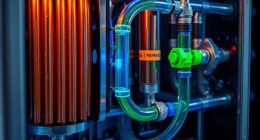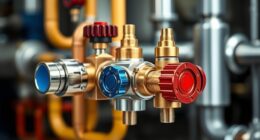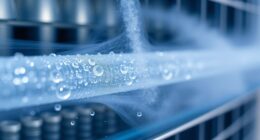Fed up with feeling cold during the winter season? We have the perfect solution for you.
In our article, ‘Revolutionize Your Warmth: Master Heat Pump Troubleshooting,’ we’ll show you how to take control of your own comfort. By understanding the basics and identifying common issues, you’ll be able to diagnose and fix heat pump problems like a pro.
Get ready to transform your home into a cozy haven with our expert tips and tricks.
Key Takeaways
- Importance of heat pump maintenance, including regular troubleshooting and filter replacement
- Addressing refrigerant leaks and troubleshooting thermostat settings are crucial for optimal heat pump performance
- Common heat pump issues include compressor problems, defrost issues, refrigerant leaks, and thermostat malfunctions
- Optimizing heat pump efficiency through regular maintenance, filter cleaning or replacement, and improving home’s energy efficiency
Understanding the Basics of Heat Pump Troubleshooting
We’ll start by understanding the basics of heat pump troubleshooting.
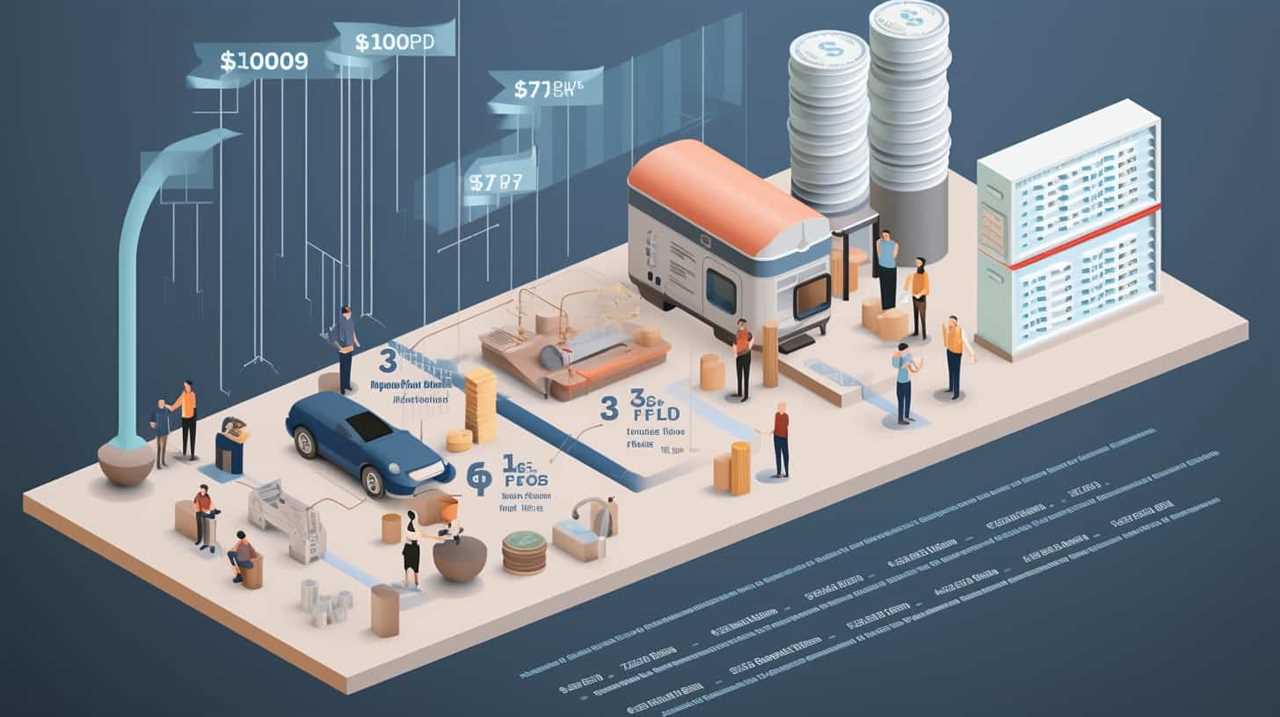
When it comes to heat pump maintenance, it’s essential to have a good grasp of troubleshooting techniques. A heat pump is a complex system that requires regular maintenance and occasional troubleshooting to ensure optimal performance.
One of the first troubleshooting techniques is to check the thermostat settings. Ensure that it’s set to the correct temperature and mode.
Next, inspect the air filters and clean or replace them if necessary. Clogged filters can restrict airflow and reduce the efficiency of the heat pump.
Additionally, it’s crucial to check the outdoor unit for any blockages or debris that might hinder its operation.

Identifying Common Heat Pump Issues and Solutions
To effectively troubleshoot heat pump issues, we need to identify common problems and their solutions. Here are some common heat pump issues and how to address them:
Compressor Issues: If the heat pump isn’t heating or cooling properly, it may be due to a faulty compressor. Check the compressor for any signs of damage or wear and tear. If necessary, replace the compressor to restore normal operation.
Defrost Problems: If the heat pump is constantly freezing up or not defrosting properly, it could be a problem with the defrost cycle. Check the defrost control board and thermostat settings to ensure they’re functioning correctly. Clean the coils and check for any obstructions that may be preventing proper defrosting.
Refrigerant Leaks: If the heat pump isn’t cooling or heating efficiently, it may be due to a refrigerant leak. Inspect the refrigerant lines and connections for any signs of leaks. If a leak is detected, repair the leak and recharge the system with the appropriate amount of refrigerant.

Thermostat Issues: If the heat pump isn’t turning on or off properly, it could be a problem with the thermostat. Check the thermostat settings and replace the batteries if necessary. If the thermostat is faulty, replace it with a new one.
Electrical Problems: If the heat pump isn’t working at all, it may be due to electrical issues. Check the circuit breakers and fuses to ensure they aren’t tripped or blown. If the electrical components are damaged, repair or replace them as needed.
Diagnosing Heat Pump Performance Problems
When diagnosing heat pump performance problems, there are several key points to consider.
Firstly, low airflow can be a common cause of issues, which may be due to a dirty air filter or a malfunctioning blower motor.

Secondly, refrigerant leaks can significantly impact the heat pump’s efficiency, requiring careful leak detection and repair.
Lastly, troubleshooting thermostat settings can help identify any potential issues with temperature control.
Low Airflow Causes
Our first step in diagnosing heat pump performance problems is to identify the specific causes of low airflow. Low airflow can significantly impact the efficiency and effectiveness of a heat pump system. Here are some common causes to consider:
- Airflow restrictions caused by dirty or clogged filters
- Improperly sized or malfunctioning blower motor
- Blocked or obstructed vents or registers
- Damaged or disconnected air ducts
- Faulty fan control switch or relay
Regular filter replacement is crucial to maintain proper airflow and prevent restrictions. By ensuring clean filters, you can optimize the performance of your heat pump.
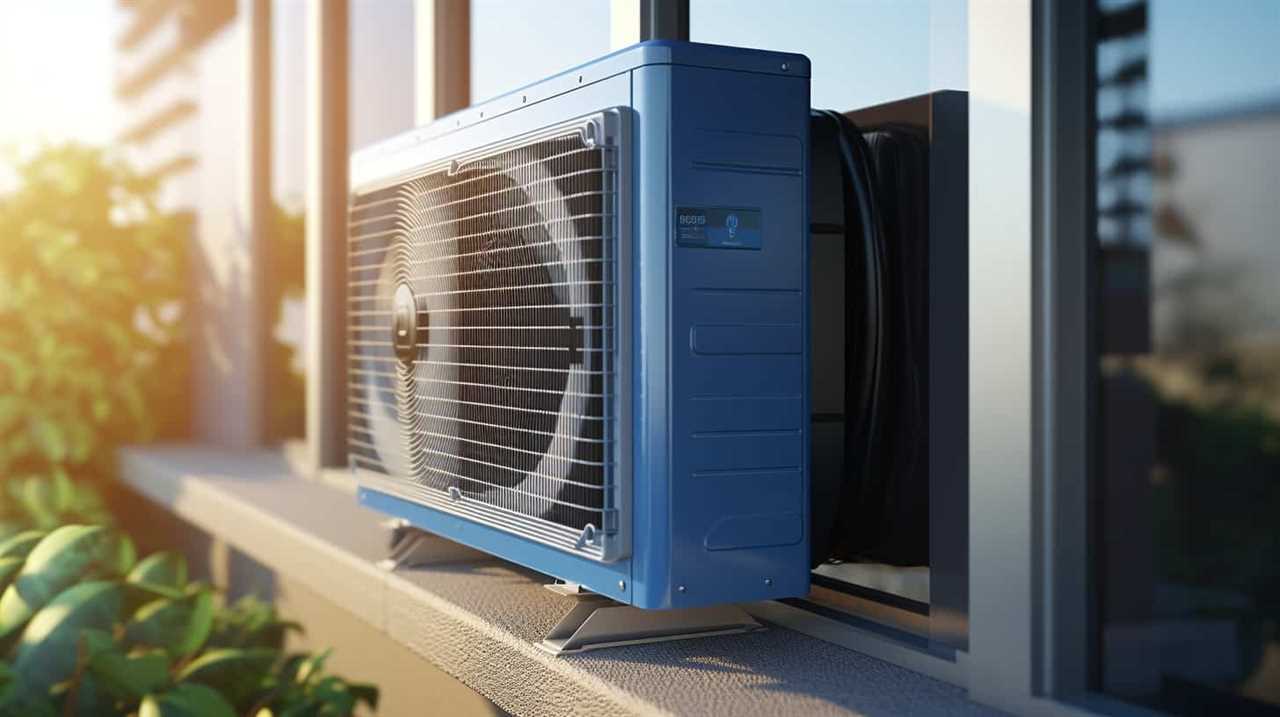
Once the low airflow causes have been identified and addressed, we can move on to the next step: refrigerant leak detection. This is essential in maintaining the overall functionality and efficiency of your heat pump.
Refrigerant Leak Detection
Identifying and addressing refrigerant leaks is crucial for diagnosing heat pump performance problems, as they can significantly impact the efficiency and effectiveness of the system. Refrigerant leaks not only lead to decreased cooling or heating capacity but can also cause system breakdowns if left unattended. Therefore, it is essential to detect and address these leaks early to prevent costly repairs and ensure optimal heat pump performance.
To aid in the detection of refrigerant leaks, the following table provides an overview of common signs and symptoms:
| Signs and Symptoms | Possible Causes |
|---|---|
| Insufficient cooling or heating | Low refrigerant charge |
| Ice buildup on the outdoor unit | Refrigerant leak |
| Hissing or bubbling noises | Refrigerant leak |
| High electric bills | Refrigerant leak |
By regularly inspecting your heat pump, checking for these signs, and promptly addressing any suspected refrigerant leaks, you can prevent further damage and optimize the performance of your system.

Now that we have covered refrigerant leak detection, let’s move on to the next section: thermostat settings troubleshooting.
Thermostat Settings Troubleshooting?
To ensure optimal heat pump performance, we need to troubleshoot thermostat settings and address any related performance problems. Here are some common issues to consider when troubleshooting thermostat settings:
Thermostat Calibration: A poorly calibrated thermostat can lead to inaccurate temperature readings and improper heat pump operation. It’s important to check and adjust the calibration if necessary.
Wiring Issues: Faulty or loose wiring connections can disrupt the communication between the thermostat and the heat pump, causing performance issues. Carefully inspect the thermostat wiring for any signs of damage or loose connections.

Incorrect Fan Settings: The fan setting on the thermostat should be set to ‘Auto’ instead of ‘On.’ If the fan is constantly running, it can affect the heat pump’s efficiency.
Programmable Thermostat Settings: Ensure that the thermostat is correctly programmed for your desired temperature settings and schedule. Incorrect programming can lead to unnecessary energy consumption and discomfort.
Battery Replacement: If your thermostat uses batteries, make sure to replace them regularly to avoid any power-related issues.
Troubleshooting Heat Pump Electrical and Control Systems
We can troubleshoot heat pump electrical and control systems by inspecting the wiring connections and testing the control board for any faults.
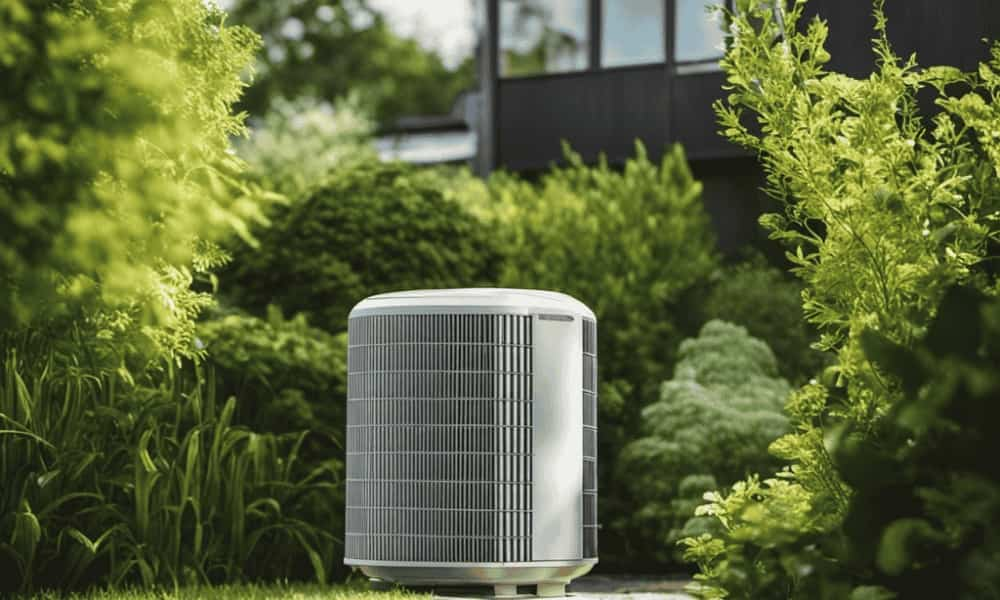
When it comes to thermostat troubleshooting, it’s important to check the wiring connections between the thermostat and the heat pump. Make sure that all the wires are securely connected and that there are no loose or damaged wires.
Additionally, it’s crucial to regularly perform electrical system maintenance to ensure the proper functioning of your heat pump. This includes cleaning and inspecting the electrical components, checking for any signs of wear or damage, and tightening any loose connections.
Optimizing Heat Pump Efficiency: Tips and Tricks
To optimize heat pump efficiency, we can implement various tips and tricks that will help us maximize the performance of our heating system. Here are some key strategies to consider:
Regular heat pump maintenance: Schedule regular maintenance appointments to ensure that your heat pump is clean, well-lubricated, and operating at peak efficiency.

Clean or replace filters: Dirty filters can restrict airflow and reduce the efficiency of your heat pump. Clean or replace them regularly to maintain optimal performance.
Keep the area around the heat pump clear: Remove any debris or obstructions around the outdoor unit to ensure proper airflow and prevent any potential damage.
Use a programmable thermostat: Set your thermostat to adjust the temperature based on your schedule, reducing unnecessary energy consumption.
Supplement with insulation: Improve the energy efficiency of your home by adding insulation to walls, attics, and crawl spaces.

Advanced Heat Pump Troubleshooting Techniques
Let’s now explore some advanced heat pump troubleshooting techniques.
Two common issues that can arise are error codes and refrigerant leaks.
Error codes provide valuable information about the specific problem, allowing for a quicker and more targeted resolution.
Refrigerant leaks, on the other hand, can lead to a decrease in heat pump performance and efficiency.

Common Error Codes
Our first step in advanced heat pump troubleshooting is to understand the common error codes that may appear. These error codes provide valuable information about the specific issue affecting the heat pump. Here are some of the most common error codes and their meanings:
E1: This code indicates a thermostat malfunction, which may require recalibration or replacement.
E2: This code signifies a compressor failure, which could be due to a faulty motor or electrical issue.
E3: This code suggests a refrigerant leak, which requires immediate attention from a professional technician.
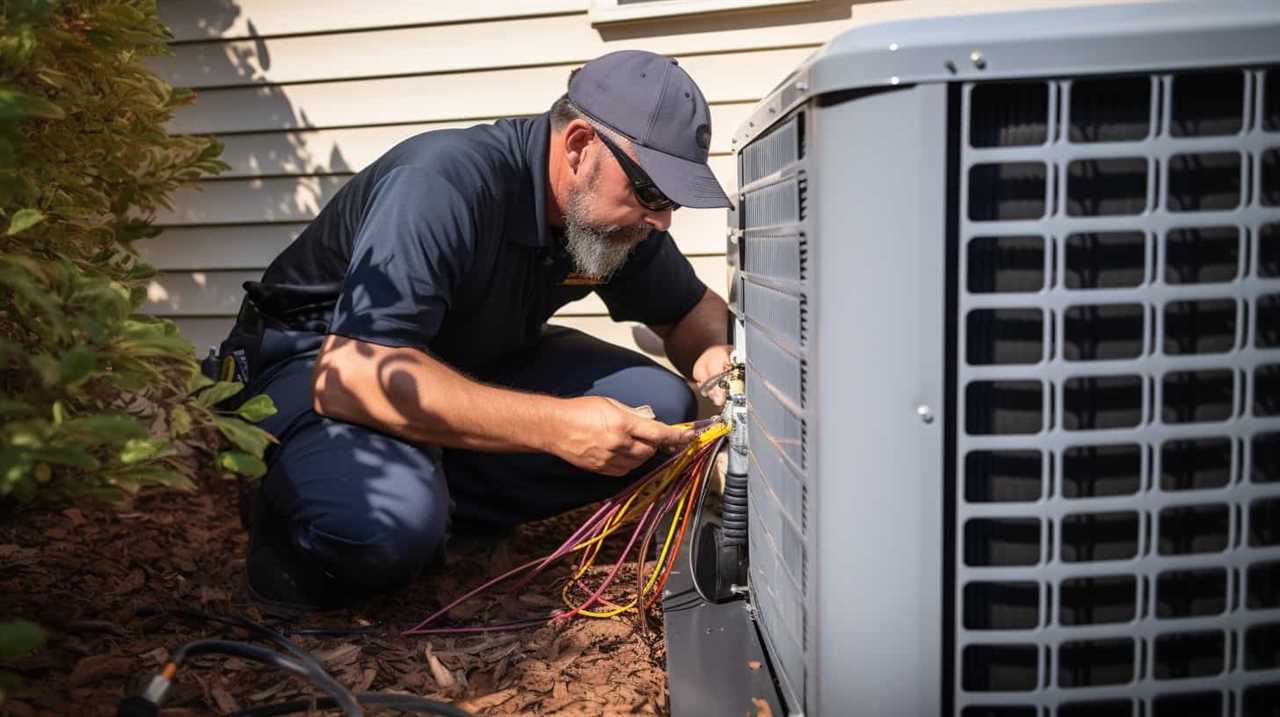
E4: This code points to a problem with the defrost cycle, such as a malfunctioning defrost sensor or control board.
E5: This code indicates an airflow issue, which could be caused by a dirty air filter or blocked vents.
Refrigerant Leaks
When dealing with refrigerant leaks in heat pump troubleshooting, it is important to identify the source of the leak and address it promptly. Refrigerant leaks can have serious consequences for the performance and efficiency of a heat pump system. Not only do they lead to a loss of refrigerant, which can impair the heat transfer process, but they can also result in higher energy consumption and reduced cooling or heating capability. Detecting refrigerant leaks requires the use of specialized tools and techniques. Some common refrigerant leak detection methods include electronic leak detectors, ultraviolet dye, and pressure testing. Once a leak is detected, it is crucial to repair or replace the faulty component to prevent further leaks and restore optimal heat pump operation.
| Refrigerant Leak Detection Methods | Consequences of Refrigerant Leaks | Repair Options |
|---|---|---|
| Electronic Leak Detectors | Loss of refrigerant | Replace faulty part |
| Ultraviolet Dye | Higher energy consumption | Repair leak |
| Pressure Testing | Reduced cooling/heating capability | Replace component |
Frequently Asked Questions
Can I Troubleshoot My Heat Pump if I Have No Prior Technical Knowledge?
Yes, we can help troubleshoot your heat pump even if you have no prior technical knowledge. Our troubleshooting steps and techniques are designed to guide you through the process and identify any issues.

How Often Should I Clean or Replace the Air Filters in My Heat Pump?
Regular air filter maintenance is crucial for optimal heat pump efficiency. Dirty filters can restrict airflow, reducing performance and increasing energy consumption. Signs of a dirty filter include reduced airflow, increased dust, and decreased heating or cooling capacity.
Are There Any Specific Maintenance Tasks I Can Perform to Prevent Common Heat Pump Issues?
We can prevent common heat pump issues with regular preventive maintenance tasks. By performing these tasks, we can ensure the optimal functioning of our heat pump and avoid any potential problems in the future.
What Are the Potential Causes of a Heat Pump Not Turning on at All?
If your heat pump isn’t turning on at all, there could be several potential causes. We will discuss heat pump troubleshooting steps and signs of a faulty heat pump to help you diagnose the issue.
How Can I Determine if My Heat Pump Is Operating at Its Maximum Efficiency?
To determine if our heat pump is operating at maximum efficiency, we should look for heat pump efficiency indicators and signs of heat pump inefficiency. These can help us identify if our system is working optimally or needs maintenance.

How Can I Troubleshoot Heat Pump Issues Using the Definitive Guide?
To troubleshoot heat pump issues effectively, utilizing the definitive guide that outlines heat pump troubleshooting techniques is highly recommended. This comprehensive resource enables you to identify and address common problems such as insufficient heating or cooling, unusual noises, or inadequate air circulation. By following the step-by-step instructions provided, you can diagnose and resolve heat pump issues with confidence.
Conclusion
In conclusion, mastering heat pump troubleshooting is essential for revolutionizing your warmth. By understanding the basics, identifying common issues, and diagnosing performance problems, you can effectively troubleshoot your heat pump.
Optimizing efficiency through electrical and control system troubleshooting, as well as implementing advanced techniques, will ensure a reliable and efficient heat pump system.
So, embark on this journey of technical prowess and unlock a world of warmth and comfort like never before, as you become the master of your heat pump’s performance.






